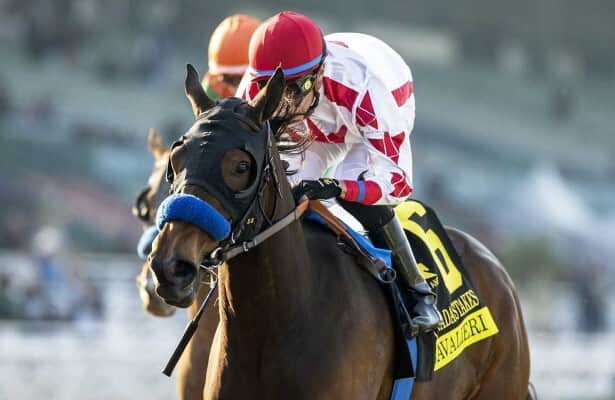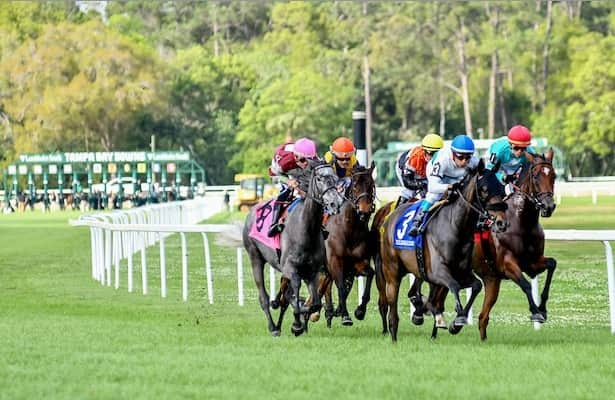Churchill Downs, NYRA Take on Private Horse Racing Regulator

A new national body that regulates the safety and integrity of horseracing has become the target of a constitutional lawsuit that could shake up the sport.
Last week, Churchill Downs Inc. and the New York Racing Association (NYRA) sued the Horseracing Integrity and Safety Authority (HISA) and others in a Kentucky federal district court. Churchill Downs conducts the Kentucky Derby and other racing activities, while NYRA operates New York’s three largest thoroughbred tracks: Aqueduct Racetrack, Belmont Park and Saratoga Race Course.
The plaintiffs contend that actions by HISA—a private regulatory organization that Congress vested with power to oversee the sport—violate the U.S. Constitution and the Administrative Procedure Act. Other defendants include HISA board members, the Federal Trade Commission, which reviews HISA proposed rules and regulations, and FTC commissioners.
Churchill Downs and NYRA object to several aspects of HISA’s oversight, but central to their grievance is HISA’s alleged “threat” to bar Churchill Downs and NYRA “from conducting any horseraces until they pay [HISA] millions of dollars in illegally imposed fees.”
HISA will “aggressively defend itself” against the lawsuit, the group said in a statement. HISA contends Churchill Downs and NYRA “have refused to comply” with a rule that the FTC approved.
For much of the country’s history, individual states regulated horseracing, with minimal federal oversight related to gambling. That changed in 2020, when President Donald Trump signed the HISA Act into law. The Act enjoyed bipartisan support, including Sen. Mitch McConnell (R-Ky.) and Rep. Paul Tonko (D-N.Y.), and reflected a desire for national and uniform standards related to anti-doping, medication control, racetrack safety and other aspects of horseracing.
Those standards, created by a board whose members are supposed to be free of conflicts, are intended to promote a safer sport for horses and jockeys. They are also supposed to set baseline rules that safeguard the integrity of the sport.
But HISA has attracted critics, including those who believe the adopted standards undermine safety and efficacy goals and unreasonably remove state autonomy over a sport that states have long overseen. The Act also places the burden of funding HISA on states through annual fee assessments.
In a 51-page complaint drafted by Thomas H. Dupree Jr. and other attorneys from Gibson, Dunn & Crutcher, Churchill Downs and NYRA contend HISA failed to follow the Act by assessing fees mainly on total prize money paid to race winners (i.e. a racetrack’s purse) instead of on a state’s share of racing starts. The complaint notes that in 2022, a federal court in Louisiana found this purse-based structure to likely violate the Act since the Act doesn’t mention use of purses for determining fees.
The plaintiffs also argue that HISA is statutorily obligated to bring enforcement actions by successfully suing in federal court—meaning it must persuade a court that it is in the right. But as the plaintiffs tell it, HISA has instead used its own in-house enforcement process to conclude Churchill Downs and NYRA owe millions of dollars and face bans, fines and other punishments.
In addition, Churchill Downs and NYRA claim HISA has violated Article III of the Constitution, which doesn’t authorize Congress to delegate to agencies the adjudication of cases involving matters of private right. Those cases are expected to go to the courts. The plaintiffs argue that since HISA is a private corporation, and since it threatens to prohibit Churchill Downs and NYRA from conducting horse races, the dispute must be heard in a court.
“Disputes between private entities,” the complaint charges, must “be adjudicated in federal courts—not within administrative agencies and certainly not within private, unaccountable corporations.”
The complaint also accuses HISA of violating the private non-delegation doctrine, a constitutional principle that generally prohibits Congress from delegating regulatory authority to private entities and where a private entity is part of a government regulatory program, government oversight must be substantial. As Churchill Downs and NYRA tell it, HISA is a private entity that is acting without meaningful government checks while enforcing impermissible rules.
Lastly, Churchill Downs and NYRA claim the defendants have violated the Due Process Clause of the Fifth Amendment, which guarantees that no person shall be deprived of life, liberty or property without due process of law.
HISA is portrayed as denying Churchill Downs and NYRA of due process by serving as its own judge in deciding whether the plaintiffs “are liable for millions of dollars in assessed fees by subjecting them to its internal disciplinary process.”
Churchill Downs and NYRA contend HISA has an “obvious” conflict of interest since it wants to receive “millions of dollars” to run its operations.
HISA did not respond to a request for comment. In the weeks ahead, attorneys for HISA and the other defendants will have the opportunity to rebut the plaintiffs’ claims and seek their dismissal. Expect them to raise arguments that have worked to varying degrees in other cases challenging the constitutionality of the Act.
As the complaint acknowledges, in other cases where states, racetracks, state racing commissions, breeders and other groups argued the HISA Act violated the constitution, some courts have rejected the plaintiffs’ arguments.
For example, in Walmsley v. FTC (2024), a federal court in Arkansas and later the U.S. Court of Appeals for the Eighth Circuit concluded the Act complies with the private nondelegation doctrine because ultimately a governmental agency, the FTC, has discretion over the rules. But in another case National Horsemen’s Benevolent & Protective Association v. Black (2024), the U.S. Court of Appeals for the Fifth Circuit found the Acts providing HISA with enforcement powers—including power to investigate, conduct searches and issue subpoenas—violated the private nondelegation doctrine since approval of the government (FTC) is not required.
Given that federal circuits have offered conflicting rulings on the HISA Act, and given that Churchill Downs and NYRA v. HISA et al. is fundamentally about the power of agencies and private entities armed with government-like powers, the case could ultimately attract the attention of the U.S. Supreme Court. The Court has recently addressed topics in that space, including in Loper Bright Enterprises v. Raimondo (ending Chevron deference) and SEC v. Jarkesy (ruling defendants are entitled to a jury trial in some agency actions).
Related
Leading Parx jockey Sanchez will serve 7-day suspension
Photo: Jason Moran / Eclipse Sportswire Jockey Mychel Sanchez will serve a seven-day suspension and pay an additional $1,750 in fines
Bill Mott talks about plans for Sovereignty, Just F Y…
Photo: Gulfstream Park / Lauren King Sovereignty, dramatic late-running winner of the Fountain of Youth (G2) March 1, is being pointed
Up-and-coming Cavalieri chases Grade 1 glory in Beholder Mile
Photo: Santa Anita / Benoit Photo Cavalieri and Alpha Bella, who finished one-two in the Grade 3 La Cañada in January at Santa Anita,
4 stakes showcase shipping stars on Tampa Bay undercard
Photo: Gonzalo Anteliz Jr. / Eclipse Sportswire The stars will shine Saturday at Tampa Bay Downs, and not just in the Grade 3 Tampa Ba











